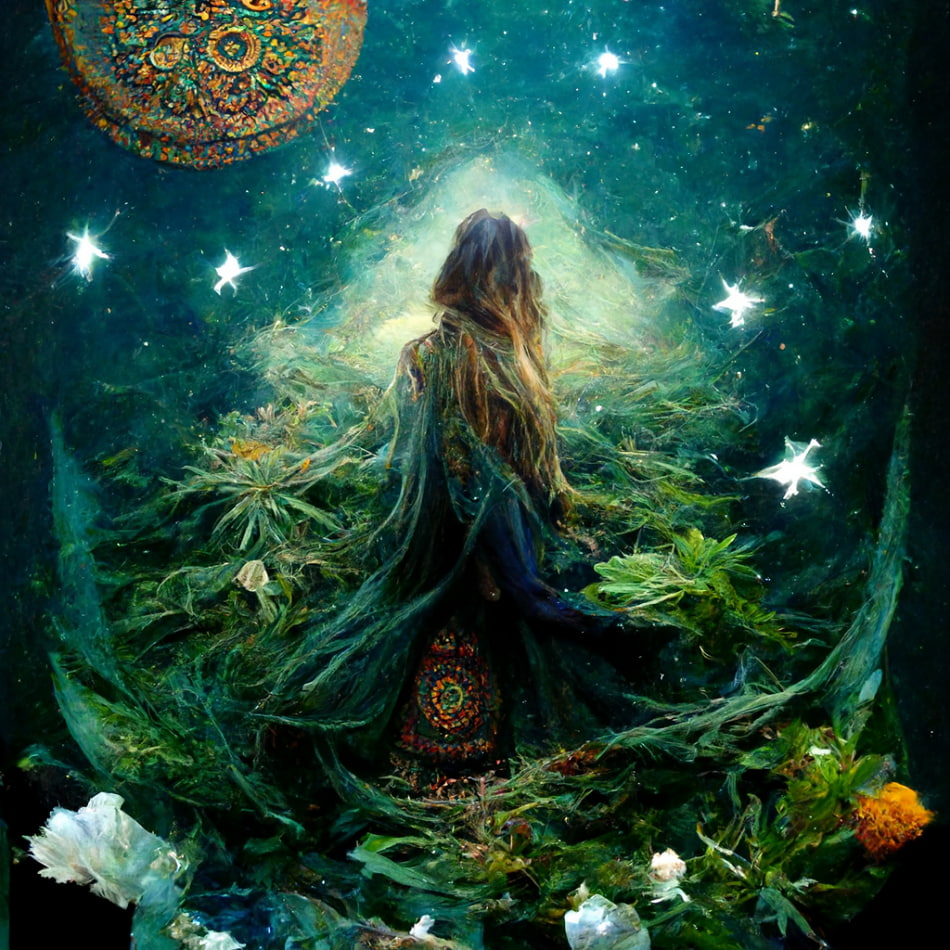There are many ways of following the mystical path in our Universe. But what is a mystic? In essence, a mystic is someone who seeks a truth or insight that goes beyond what is typically understood to be part of the human experience. He or she might or might not have received the insight they are seeking.
And they might or might not have been initiated into any number of spiritual or religious mysteries. The shared quest for a transcendent truth that goes beyond purely intellectual thinking or knowing is what binds all such individuals together.

What Is a Mystic
According to common perception, a mystic is typically someone who engages in esoteric activities or studies magic or the occult. Although those who engage in these behaviors may self-identify as such, not all of them involve such behaviors. In other words, somebody may call himself a psychic, and other person wouldn’t do it, despite of having strong mystic powers. It is challenging to define mysticism in terms other than the search for transcendent truth because it manifests itself in a remarkable variety of ways. However, there are certain significant mysticisms that share characteristics.
According to another definition of what is a mystic – it’s someone who has a spiritual experience of unity with The One. It could be The Source, God, Mother Earth, or the universe, or anything else. Despite being uncommon, everyone can have such an experience. The only thing a person needs is to briefly lose your separate individual ego, personality, etc. A seeker has to understand the oneness with everything that exists. It’s not an easy thing to achieve, that’s for sure, but it’s absolutely possible.
Mystic, Psychic, Medium – What is The Difference?
A mystic, a psychic, and a medium are all terms associated with individuals who possess or claim to possess supernatural or extrasensory abilities. While there may be some overlap in their practices, each term represents a distinct role with its own unique characteristics.
A mystic is someone who seeks a direct and personal experience of the divine or spiritual realm. Mystics often engage in deep contemplation, meditation, and spiritual practices to gain insight and understanding beyond the ordinary human perception. They focus on transcending the limitations of the physical world and connecting with higher truths.
A psychic, on the other hand, is an individual who claims to possess intuitive or clairvoyant abilities. Psychics rely on their heightened senses to tap into information that is beyond the reach of ordinary perception. They may use various tools such as tarot cards, crystal balls, or palmistry to assist them in their readings, offering insights into the past, present, or future.
A medium is a person who acts as a bridge between the physical world and the spirit realm. Mediums claim to communicate with spirits of deceased individuals, relaying messages or providing comfort to the living. They often conduct séances or engage in other forms of spirit communication, utilizing their intuitive abilities to receive and convey messages from the other side.
While all three terms involve aspects of spirituality and supernatural abilities, the main distinction lies in their focus and the specific abilities they emphasize. Mystics seek direct spiritual experiences, psychics rely on intuitive insights, and mediums connect with spirits. Each role offers its own unique perspective and approach to understanding the unseen aspects of existence.
Mysticism And Religion
Mysticism is at the core of the spiritual path for individuals who identify as “spiritual but not religious,” as it is the same drive we carry within to connect with the Divine.
Almost every religious system has its own distinct mysticism. Mysticism is the common thread that ties all of these religions— from Buddhism and Hinduism to Christianity, Judaism, Islam, Taoism, and more — together, regardless of how dissimilar the dogmas of each path may appear at first glance.
There are various levels of mysticism among many mainstream religions. Separate organizations are also common, which the majority religious establishment may or may not consider to be heretical.
For instance, the Sufi tradition is a mystic tradition within Islam that upholds a Divine unity and rejects the dualistic notion of the Self and God as being separate. Many Christians see Gnosticism as a heretical offshoot and the forerunner of modern Christian churches.
Who Can Be a Mystic
Who can really be a mystic? It has nothing to do with your outward existence and everything to do with your inner experience, whether you’re a bartender, a bus driver, an office worker, or a photographer. You surely don’t have to be a witch, cook potions in a cauldron, and cast some spells for protection, love or money. But you can do this – if your soul likes it.
A mystic is a regular person who goes about their daily business while having these deep moments of union with The Source. You may also have a common natural mystic quality – a really strong connection and affinity to nature.
For many people with mystical tendencies, this is the meaning behind the name “Mother Earth”— it refers to a felt connection to the earth as a beloved family member. Although the goal is to fully embody our humanity and our connection to nature, doing so is nevertheless a mystical experience since our distinct ego vanishes into the great mystery of The One.
7 Signs Of a Mystic
Mystic outward appearance has evolved throughout time. It changed from robe-wearing monks and priests to the leather- and casual- wearing cults of the 21st century. But the inner selves of mystics have remained the same across all races, religions, and eras. Based on years of experience and research), the following are 7 characteristics of a modern mystic by 2spirits.com:
- You desire to find some sort of “home” because you struggle to fit in or belong in this world.
- You don’t like how your life is going (no matter how much material success you experience)
- Despite feeling lost and aimless, you are meant to make a significant difference in the world.
- You’re discouraged by different spiritual, self-help, and religious routes (i.e., many of these paths seem shallow to you and aren’t “deep enough”)
- You intensely crave for a life filled with God or the Divine.
- Once, you experienced a spiritual awakening, any mystic experience, or a “dark night of the soul.”
- You have enhanced sensitivity and/or are an empath, therefore you experience everything very strongly.
There may be other signs of a mystic soul, but these 7 are the most common and popular among spiritual people. Some mystics talked about constant feelings of solitude, strange deep thoughts, spiritual crises, and even mental illnesses.
The Bottom Line
We might recover a sense of harmony, joy, and peace that resides at the very Center of everything by rekindling our yearning for mysticism, both internally and externally, individually and collectively.
The fact is that everyone who is a human has an unquenchable need for mysticism. Regardless of how agnostic we may be, we all have an innate desire to relate to something bigger than ourselves. It may be the Universe, a country, a football club, or returning to our most fundamental selves, the Divine/God.
In the end, the mystical road of spiritual awakening reveals some simple things to us. We are not fundamentally distinct, regardless of how alienated, defective, or hopeless we may feel.

